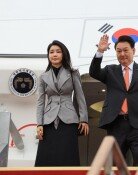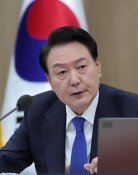[Editorial] U.S. 1, Korean Taxpayer 0
[Editorial] U.S. 1, Korean Taxpayer 0
Posted August. 28, 2006 07:26,
U.S. Secretary of Defense Donald Rumsfeld sent a letter to Korean Minister of Defense Yoon Gwang-woong last week to reaffirm the U.S. plan to transfer wartime operational control by 2009. The plan was approved by U.S. President George W. Bush in a meeting of U.S. field commanders including U.S. Forces Korea (USFK) Commander Burwell Bell. In the upcoming Korea-U.S. summit next month, the issue will be included in the joint statement. At the annual Korea-U.S. Security Consultative Meeting in October, the two countries plan to discuss a specific roadmap for it.
Self-reliance that the Roh Moo-hyun administration has trumpeted is now resulting in all this. The government, which has claimed that it will secure military strength needed for self-reliant national defense with a goal to take back the wartime operational control by the year 2012, should explain how it will deal with the new deadline that is three years faster than the previous one. With regard to the letter from Rumsfeld, the Ministry of Defense (MOD) explained, [The letter] is nothing but a reconfirmation of the U.S. existing stance; it has not been decided when to transfer wartime operational control, by which it means it may discuss with the U.S. the issue of postponing the wartime operational control transfer.
There are many reasons, however, behind the U.S. effort to make the transfer earlier with the diplomatic rhetoric, If the Korean people want it. They are expressing their regret for Koreas anti-American, self-reliant approach, and they also aim at increasing their negotiating power in such issues as sharing of USFK defense expenses, relocation of the USFK garrison from Yongsan, Seoul to Pyeongtaek, Gyeonggi Province, and securing of an Air Force shooting range. The U.S. secretary of defense, for instance, has demanded a hike in Koreas share of defense expenses, which currently is below 40 percent, to an equitable level of over 50 percent.
We are now facing the consequences of self-reliance that we have worried about. We are already far short of the time and money needed to secure deterrence power against North Korea; now we have a tighter deadline, so tax burdens on the people are bound to increase further. It is estimated that per-household expenses exclusively for national defenseexcluding costs to be shouldered additionallywill reach 12.8 million won by 2011 and 52.8 million won by 2020.
For the U.S., this is quite a good bargain. They can now escape from the constraints of automatic engagement in case of emergency on the Korean Peninsula, otherwise known as the trip wire doctrine, which they have considered a huge burden. At the same time, they have successfully secured the strategic flexibility of the USFK, which guarantees the utilization of the USFK as a base for keeping China in check in the future.
The only victim is the Korean people, who lost an ally while having to pay more taxes and shoulder an uncertain future. By the year 2009, President Roh Moo-hyun will have already retired. Out of burdens on the people that are bound to increase, how much will President Roh be able to share? He will have to answer this question first if he still wants to be a president who not only devastated the economy but also passed on security uncertainties to the next generation.







